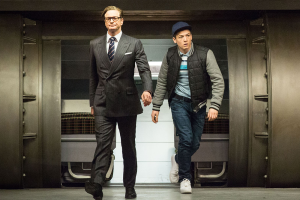
★★★☆☆
Although “Kingsman” has an all-star cast, it lacks originality and is only able to bring about a laugh with some of its shock value. With Colin Firth and Samuel L. Jackson, this film was surrounded with high expectations. But the movie draws too heavily from other films and lacks a coherent vision. Without consistent concepts, the humor fails to really hit home.
Based on Mark Millar’s and Dave Gibbons’ comic book series “The Secret Service,” “Kingsman” follows the life of a young man whose legacy as the son of an honorable secret serviceman pulls him off the streets as a new recruit for a spy organization by the same name. Modelled after King Arthur’s Round Table, the Kingsman secret service prides itself in conducting its worldwide services unnoticed through the combined efforts of respectable and gentlemanly agents.
The protagonist Gary “Eggsy” Unwin (Taron Egerton) is trained under the watchful eye of Agent Harry Hart (Colin Firth). As Eggsy learns about the conduct of a true gentleman and focuses on acquiring the necessary skill set for fieldwork, a tech genius launches a global threat against the entire human population in a twisted, evil plot, posing the ultimate challenge to the Kingsman service.
As a parody, “Kingsman” certainly lives up to its genre with unapologetic jabs at existing figureheads in the media, referencing public policy drama, scandals and celebrity gossip. The lead cast members execute engaging performances, with Colin Firth whipping out his British accent and tapping into his former roles as both King George VI and Mr. Darcy to portray the ultimate gentleman.
Meanwhile, Samuel L. Jackson successfully plays the role of the villainous megalomaniac Chez Valentine, a walking contradiction characterized by an exaggerated lisp and a ridiculously hypocritical repulsion by the sight of blood. All the while, he orchestrates multiple mass murders.
Eagerton’s performance is weaker, as the relatively young actor finds his footing only intermittently throughout the movie. While he thrives as the protective brother and the concerned son, Egerton seems less comfortable with role of the dismissive, emotionally detached agent-in-the-making.
However, in his attempt to pay tribute to Millar’s and Gibbons’ work, director and producer Matthew Vaughn’s adaptation leans too much on the compilation of past successes, thereby producing a film wherein “This is the End” meets a satiric James Bond remake.
In spite of its best efforts, “Kingsman” lacks continuity, as its over-dependency on past films and many unrelated cultural references detract from the plot. The film also aims to combine tones of genuine sentiment with outrageous satiric digs; however, these elements lack balance and “Kingsman” teeters between elements of all film genres.
Finally, there is a seemingly endless, gory blood bath in a chapel, at which point the film does a complete 180-degreeturn into a full-blown imitation of “This is the End,” complete with projectile vomiting and the impalement of several bodies with any available poles and rods.
While the graphics and overly dramatized fight scenes are well choreographed and filled with thematically appropriate head explosions orchestrated in time with Elgar’s “Land of Hope and Glory,” the transition from more heavily censored scenes in the beginning to incessant close-ups of messy dismemberment and stabbings is ill-prepared. Even the violent outbreaks, though unmistakably characterized by Vaughn’s signature slow-motion close-up shots, seemed slightly discombobulated when followed by a shaky camera that is awkwardly distanced from the characters. While the cinematography is generally easy to follow throughout the film, it faltered at the quick-footed action sets and resulted in a few too many disorienting fight scenes that were hard to follow. There were also several parkour scenes, seemingly inspired by videogames, which created somewhat awkward transitions between substantive, almost sentimental insights into Eggsy’s home life, and short-lived chase scenes shot as though the cameraman were operating a game controller.
The orchestral numbers also lacked originality, with many pieces that seemed far too familiar for Vaughn’s attempts at artistic license; in fact, one particular piece sounded eerily similar to a theme song from “Wreck-It Ralph.” Regrettably, the lack of investment in an original musical score that isn’t suffocated by an excess of neither violinists nor electric guitarists could very well be the missing piece that could have strengthened so many scenes.
Vaughn can be credited for succeeding in the shock department and leaving his audience stuck somewhere between confusion and transfixion, interrupted only by spurts of chuckling. But “Kingsman” would have been an infinitely stronger film if the focus had been on depth, not breadth. The fast-paced hodgepodge of dozens upon dozens of overdone and all-too-familiar thematic and technical elements doesn’t allow for the development of an original storyline.



















